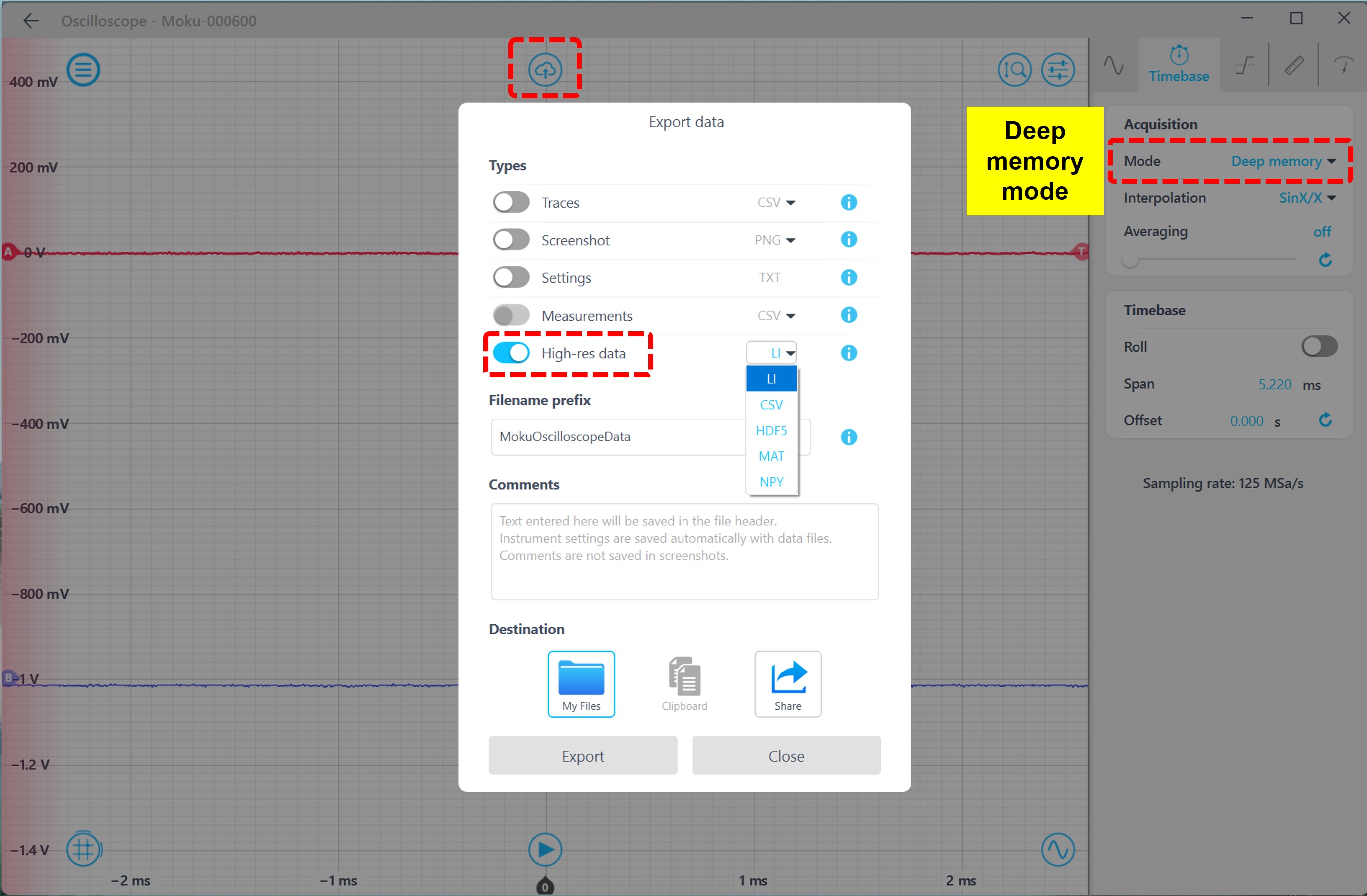ディープメモリモードでのデータ収集
Mokuアプリと Python および MATLAB でMokuディープ メモリを使用する方法を学びます
- Moku:Lab
- Moku:Go
-
Moku:Pro
Moku:Proに関するよくある質問 Moku:Pro波形発生器 Moku:Proタイム&周波数アナライザ Moku:Proロジックアナライザ/パターンジェネレーター Moku:Proレレーザーロックボックス Moku:Proロックインアンプ Moku:Proスペクトラムアナライザ Moku:Proデータロガー Moku:Pro任意波形発生器 Moku:Proマルチ機器モード Moku:Pro位相計 Moku:Pro FIRフィルタービルダー Moku:Pro PIDコントローラー Moku:Proオシロスコープ Moku:Pro周波数応答アナライザ Moku:Proデジタルフィルターボックス
- Python API
- MATLAB API
- 任意波形発生器
- データロガー
- デジタルフィルターボックス
- FIR フィルタ ビルダー
- 周波数応答アナライザー
- レーザーロックボックス
- ロックインアンプ
- オシロスコープ
- 位相計
- PIDコントローラー
- スペクトラムアナライザー
- 時間と周波数アナライザー
- 波形発生器
- ロジックアナライザ/パターンジェネレーター
- マルチ機器モード
- Mokuクラウドコンパイル
- Mokuに関するよくある質問
- LabVIEW API
Moku機器のデータキャプチャ機能は、ディープメモリモードを利用することで大幅に強化されます。拡張されたメモリ深度と高いサンプリングレートにより、ユーザーは「データのエクスポート」メニューから高解像度データを簡単にエクスポートできます。
ディープ メモリ取得は、オシロスコープと、ロックイン アンプ、PID コントローラ、デジタル フィルタ ボックス、FIR フィルタ ビルダー、レーザー ロック ボックスなど、オシロスコープが組み込まれたすべてのMoku計測器で利用できます。表 1 は、ディープ メモリ モードでさまざまなサンプリング レートで取得されたデータ ポイントの数の概要を示しています。
| Moku:Go | Moku:Lab | Moku:Pro | ||
|---|---|---|---|---|
| 1 | サンプリングレートと対応する時間範囲 |
125MSa/秒 (時間範囲 ≤ 25 ミリ秒) |
500MSa/秒 (時間範囲 ≤ 6.2 ms) |
1.25GSa/秒 (時間範囲 ≤ 10 ミリ秒) |
| チャネルあたりの取得データポイント数 | 840万 | 840万 | 3,360万 | |
| 2 | サンプリングレートと対応する時間範囲 |
125 MSa/s未満 (時間範囲 > 25 ミリ秒) |
500 MSa/s未満 (時間範囲 > 6.2 ミリ秒) |
1.25 GSa/s未満 (時間範囲 > 10 ミリ秒) |
| チャネルあたりの取得データポイント数 | 420万 | 420万 | 1,680万 |
Mokuアプリでのディープ メモリの取得
ディープ メモリ モードは、下のスクリーンショットに示すように、「タイムベース」タブで有効にできます。データを保存するには、ウィンドウの上部中央にあるクラウド アイコンをクリックするだけです。次に、「高解像度データ」オプションを切り替え、目的のデータ形式を選択して、「エクスポート」をクリックします。

APIを使用したデータ取得
MATLAB および Python API を使用してオシロスコープのディープ メモリ モードでデータを保存する例は、GitHub で入手できます。ユーザーは、これらを出発点として独自のスクリプトを作成できます。